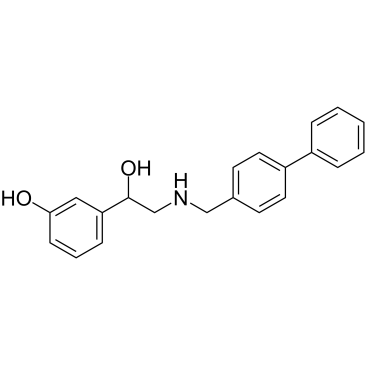775294-71-8
| Name | AC-73 |
|---|
| Description | AC-73 is a first specific, orally active inhibitor of cluster of differentiation 147 (CD147), which specifically disrupts CD147 dimerization, thereby mainly suppressing the CD147/ERK1/2/STAT3/MMP-2 pathways. AC-73 inhibits the motility and invasion of hepatocellular carcinoma cells[1]. AC-73 is also an anti-proliferative drug and an inducer of autophagy in leukemic cells[2]. |
|---|---|
| Related Catalog | |
| Target |
CD147[1] |
| In Vitro | AC-73 (5-10 μM; 24 hours; SMMC-7721 and Huh-7 cells) treatment significantly decreases the migration ability of SMMC-7721 and Huh-7 cells in a dose-dependent manner and decreases the invasion of two HCC cells in a dose-dependent manner at 24 hours. AC-73 treatment reduces HCC metastases. There are no obvious effects on cell viability when two HCC cells are treated with AC-73 at a maximum concentration of 20 μM. The possible binding sites of AC-73 on CD147 included Glu64 and Glu73 in the N-terminal IgC2 domain, which two residues are located in the dimer interface of CD147[1]. AC-73 (5-10 μM; 24 hours; SMMC-7721 cells) treatment could significantly inhibit both MMP-2 and MMP-9 mRNA expression at the concentration of 10 μM, especially MMP-2, but no obvious effect on MMP-1, MMP-3, MMP-7, MMP-11 nor MMP-13. AC-73 could dose dependently reduce the expression of MMP-2 mRNA level and secretion of the protein level using RT-qPCR analysis and gelatin zymography experiments[1]. AC-73 (5-20 μM; 6 hours; SMMC-7721 cells) treatment dose-dependently suppresses the phosphorylation of ERK1/2 and STAT3[1]. RT-PCR[1] Cell Line: SMMC-7721 cells Concentration: 5 μM or 10 μM Incubation Time: 24 hours Result: Significantly inhibited both MMP-2 and MMP-9 mRNA expression at the concentration of 10 μM. Dose dependently reduced the expression of MMP-2 mRNA level and secretion of the protein level using RT-qPCR analysis and gelatin zymography experiments. Western Blot Analysis[1] Cell Line: SMMC-7721 cells Concentration: 5 μM, 10 μM or 20 μM Incubation Time: 6 hours Result: The phosphorylation of ERK1/2 and STAT3 was dose-dependently suppressed. |
| In Vivo | AC-73 (25-50 mg/kg; for 4 weeks; Male BALB/c nu/nu mice) treatment significantly decreases the incidence of metastatic foci in nude mice. AC-73 inhibits the phosphorylation of ERK1/2 and STAT3 in a dose-dependent manner. MMP-2 is also reduced by AC-73. AC-73 could not inhibit tumor cell proliferation in vivo[1]. Animal Model: Male BALB/c nu/nu mice (4-6 weeks) with SMMC-7721 cells[1] Dosage: 25 mg/kg, 50 mg/kg Administration: Injected; daily; for 3 weeks Result: Significantly decreased the incidence of metastatic foci in nude mice. Inhibited the phosphorylation of ERK1/2 and STAT3 in a dose-dependent manner. MMP-2 was also reduced. |
| References |
| Molecular Formula | C21H21NO2 |
|---|---|
| Molecular Weight | 319.40 |
